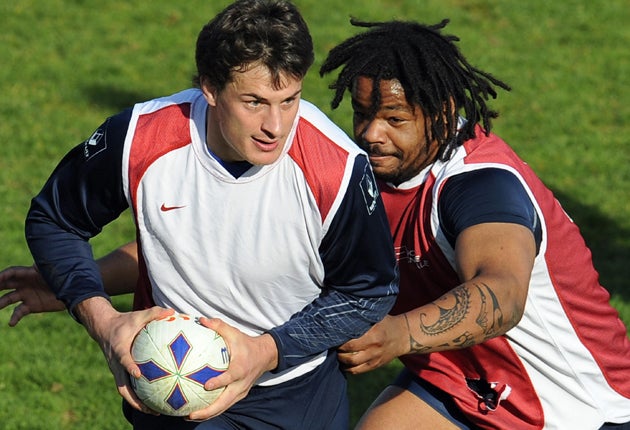Brian Ashton: France could make the running at World Cup
Tackling the issues

Two rounds left, three teams – France, England, Ireland – still in contention, the prospect of more close finishes, passionate second-half fightbacks and the occasional passage of outstanding attacking rugby: the Six Nations Championship is justifying its place at the heart of the northern hemisphere season, even if the best of it must be weighed against some edgy, error-strewn fare from everyone involved. How do I expect things to turn out? At this stage, it's difficult to see past the French as the side to beat.
Last month, just before the first round of matches, I expressed a particular interest in the various centre partnerships, because it seemed that if there were to be any signs of an expanding mindset in the European game, these were the people most likely to be responsible. Who would have the wit, the confidence and the courage to ask different questions of defences by shifting the first point of attack to the No 13 channel?
We've seen flashes of inspiration from a number of midfield players. Gordon D'Arcy and Brian O'Driscoll of Ireland have had their moments, albeit individually rather than in partnership. Gonzalo Canale, the Italian centre, made the decisive play in his team's victory over Scotland, while James Hook of Wales has demonstrated genuine footballing ability, frequently when his team have found themselves miles behind and in dire need of a spark.
But the most potent partnership has been forged by Yannick Jauzion and Mathieu Bastareaud, the French combination, and their success has largely been down to the performance of Morgan Parra, the young scrum-half from Clermont Auvergne whose contribution has been among the most striking features of the championship. He, of all the half-backs on view, has shown the best understanding of what to do when – whether to kick, to run, to feed his forwards on the drive with a short pass or release his backs.
It boils down to this: Jauzion and Bastareaud have found themselves in the happy position of receiving the ball precisely when they want it, at moments when their potential to cause real damage is at the optimum. Time and again, they have broken the first line of defence as a result of Parra's intelligence at No 9. For a 21-year-old, he has quite a head on his shoulders: it's a while since I've seen a relative newcomer at international level blessed with such awareness. He kicks goals, too, from all over the field. When you think the French also have Dimitri Yachvili, Jean-Baptiste Elissalde and Julien Dupuy in contention for World Cup places, it is difficult to imagine any side travelling to New Zealand next year with a stronger group of scrum-halves.
Parra is one of many players given a first taste of Test rugby by Marc Lièvremont, the national coach, since he was put in place in the aftermath of England's semi-final victory over them at the 2007 World Cup. Lièvremont has been criticised for a lack of consistency in selection, but with the invaluable help of the manager, Jo Maso, a knowledgeable man who has successfully provided continuity from regime to regime, he has constructed a squad to be reckoned with. It seems the French Federation has shown great faith in its coach by allowing him to experiment as and when it suits him. This has not always been the case on the far side of the Channel: I remember an occasion many years ago when Albert Ferrasse, a highly autocratic and invasive president of the union, refused to accept the selection of a particular pair of half-backs and ordered that two others play in their place.
By allowing the much-maligned Lièvremont to make decisions that seemed bizarre at the time – changing half the team from one game to the next appeared to be a firm strategy during the first two years of his tenure – the French hierarchy may have struck gold. The side is not yet a vintage one, but the all-round solidity of their game and the presence of a good many multifaceted footballers (as opposed to one-dimensional, so-called ball-carriers!) who make a point of playing the game on their feet make a strong base on which to build. Add to this a high work rate in defence and the rediscovery of a typically French brand of support running and you have a side that will take some stopping.
There were times against Wales last time out when the French discipline all but disappeared: proof that when a team puts them under sustained, dynamic pressure they are as vulnerable as anyone. On balance, though, they are favourites to win the title. Who knows? They might even make a serious impact in New Zealand in 18 months' time. History tells us that they know what it takes to win there.
Subscribe to Independent Premium to bookmark this article
Want to bookmark your favourite articles and stories to read or reference later? Start your Independent Premium subscription today.

Join our commenting forum
Join thought-provoking conversations, follow other Independent readers and see their replies